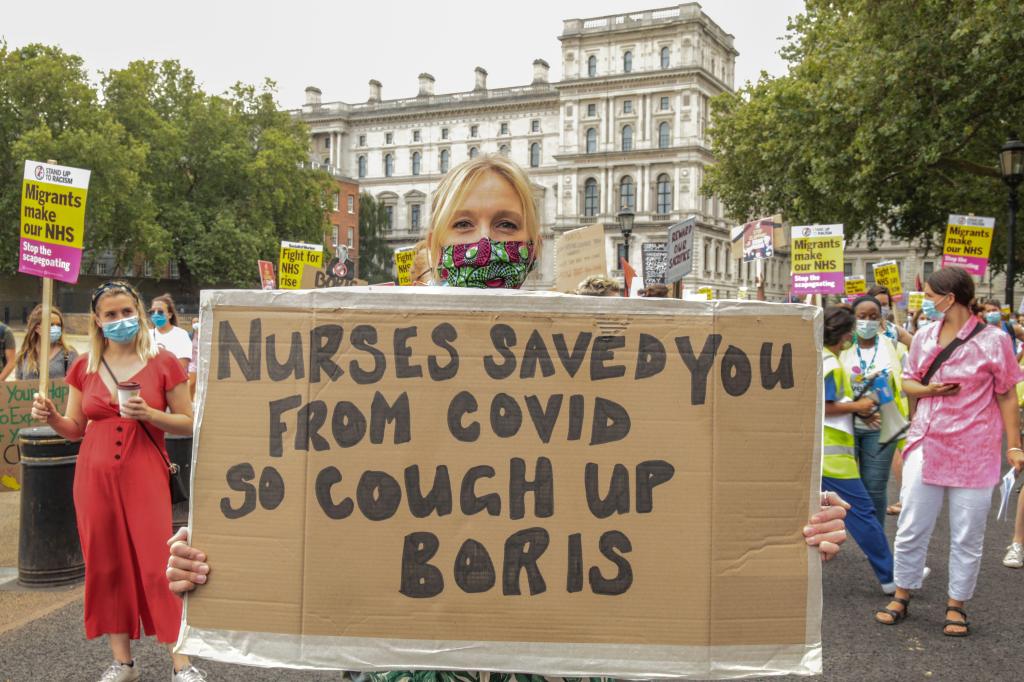Since 2010, healthcare workers in the UK have lost one fifth of their wages in real terms. Despite Boris Johnson leading the country to “clap for carers” during the height of the coronavirus pandemic, the Treasury’s July spending announcement for public sector workers included a modest pay rise for doctors – but nothing for nurses and other healthcare staff.
This refusal to grant a pay increase to those helping the country through the coronavirus pandemic has not gone unnoticed. Last month, NHS workers marched to Downing Street to demand a pay rise, and thousands more took part in over 30 protests across the country calling for better recognition of healthcare staff.
Videos by VICE
“I’m having to work during my time off alongside working full-time in our local hospital because the pay just isn’t enough,” a nurse from south west England, tells VICE News. “I’m overworked and underpaid, it’s hard to get on with it some days but we do it for the patients.”
The average NHS nurse, earning between £24,000 and £30,000, has had their take-home pay increase by just £38 over the past three years. Campaign group Nurses United UK is now calling for a 10 percent pay increase for all health and social care workers after years of below-inflation rises.
But it’s not just nurses who want fairer pay. A radiologist from Manchester who worked throughout the pandemic says that the government has ignored NHS staff like her. “We’ve come into contact with all COVID patients suspected or confirmed as they all get chest X-rays,” she says. “I think that’s been largely forgotten about in the media.”
She also notes small but consistent scrapping of assistance with expenses for workers in the NHS. “At the minute, I pay £30 a month to park the car,” she says. “We have to pay £180 every two years for a registration fee to work, even if they don’t give us a pay rise.”
Unions that represent NHS workers such as Unite, which also helped organise last month’s protests, have spoken out against the government’s reluctance to grant a pay rise. In a statement earlier this month, Unite’s national officer for health Jackie Williams said: “In a decade of Tory austerity, NHS staff has seen their pay cut by 20 percent in real terms – and no amount of Thursday evening clapping and warm ministerial words can compensate for this dramatic loss in income.”
For both the nurse and radiologist – both of whom asked to remain anonymous due to fear of repercussions at work – a pay rise would be a fair recognition of their work during the pandemic. But for many healthcare workers, it may be too late. Last month, Nursing Times reported that there has been a sharp increase in the number of nurses considering leaving the profession compared to 2019, due to the difficulty of surviving on low salaries.
But it’s not just existing NHS workers who are worried about pay. Student nurses – many of whom ended paid placements early to work on coronavirus wards, only to have their contracts terminated and lose out financially – also feel undervalued. One student nurse tells VICE News: “We were asked to provide support during the crisis but have received no extra funding or pay as promised. We’re now suddenly out of a job.”
Medical students, who were fast-tracked through their studies to the coronavirus frontline back in March, are also concerned about pay. “From a medical student’s standpoint, there needs to be more help,” says a medical student from Leeds. “You only get bursaries from a certain point while you’re training and it’s not enough to live in. You end up having to take up extra work where you can to make ends meet. For those of us not coming from wealthy backgrounds, it’s tough.”
They also point out the costs of completing a nursing degree – the study grants for which were scrapped by the Conservative government in 2015, only to be reinstated this year as a much reduced bursary, after vacancies for nursing positions reached 43,000. “Nurses are massively underpaid,” the medical student says. “It’s clear there is a class divide with most of them coming from working class backgrounds.” Without adequate financial support for healthcare students, they warn, only those from elite backgrounds will be able to reach the highest positions in the NHS.
But for many healthcare workers, with the coronavirus pandemic still ongoing, their fears are more immediate. A junior doctor from London thinks that a second wave could have a devastating impact on the NHS. “Our concerns are not taken seriously,” they say. “We have stated what we need and we’ve been ignored. If we have to strike to get the government’s attention, then unfortunately we’ll have to. I just hope it doesn’t come to this.”
The NHS cannot survive without nurses, doctors and other health and social care workers at the best of times – let alone during a global pandemic. Born out of a socialist commitment to provide medical assistance for everyone, the government must let the NHS look after its workers, too.




